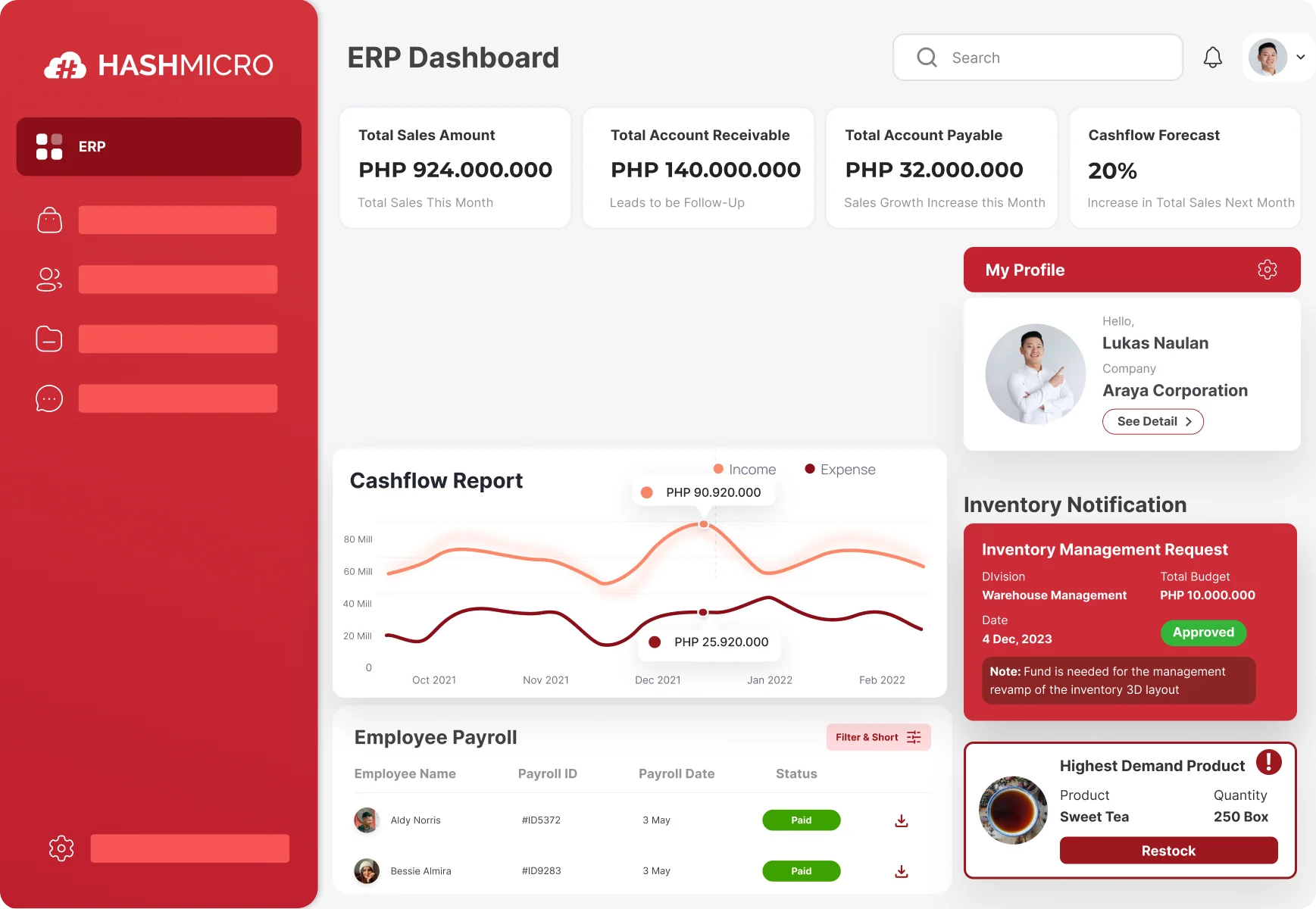Many companies face challenges like isolated data, inefficiencies, and scalability issues, often worsened by on-premise ERP systems. These systems require dedicated servers, leading to high maintenance costs, complex disaster recovery, and limited access.
To solve these problems between cloud ERP vs on premise ERP, Cloud ERP systems have become a solution. They remove the need for special hardware, cutting costs and risks. This type of ERP also provides real-time data processing and easy integration, helping streamline operations and make data more accessible.
This article will provide a comprehensive overview of Cloud ERP, highlighting how it works and discussing its various benefits to help businesses understand why it might be the right solution for their business needs.
Key Takeaways
|
Table of Contents

Understanding Cloud ERP and How it Works
Cloud ERP, or Cloud-based Enterprise Resource Planning, is a system hosted and managed by cloud-based data center vendors. These vendors are responsible for the applications, databases, operating systems, servers, and updates including security, antivirus, and feature enhancements such as disaster recovery.
Cloud ERP software operates through a network of servers located on the internet, which are used to store and manage enterprise data centrally. This system allows users to access ERP functionalities via the internet without needing on-premise hardware. The key steps in how cloud online ERP works include:
- Hosting and accessibility: The Enterprise Resource Planning is hosted on cloud infrastructure, making it accessible from anywhere with internet connectivity. This eliminates the need for local installations and maintenance.
- Integration and centralization: Cloud-based ERP integrates various business functions into a single system, centralizing data from departments such as finance, sales, and human resources. This integration facilitates seamless data flow and real-time updates across the company.
- Scalability and management: The system offers scalable resources, allowing businesses to adjust their usage based on current needs without significant capital investment. The cloud provider handles all maintenance, including software updates and security patches, reducing the IT workload for businesses.
This model leverages modern ERP cloud computing technologies to deliver a flexible, efficient, and secure ERP solution that meets the dynamic needs of contemporary enterprises.
Addressing Operational Challenges with Cloud ERP
When considering the adoption of Cloud ERP systems, businesses can expect a range of significant benefits that directly address common operational challenges. Here, we explore how Cloud ERP systems turn potential drawbacks into advantages.
- Enhanced data security
While data security is often a concern with digital systems, Cloud ERP systems provide advanced security measures including data encryption, regular security audits, and strict compliance with international data protection regulations. This capability ensures data is securely managed and protected against breaches and losses.
- Reliable access with intelligent connectivity solutions
Cloud ERP systems rely on internet connectivity but excel in delivering consistent and reliable access. Providers design these systems to minimize latency and often include offline functionalities that allow users to keep working even when the internet is down, syncing data once connectivity is restored.
- Seamless system integration
These systems offer APIs and other tools to facilitate seamless communication between diverse systems and applications. This integration capability enhances business efficiency by allowing different systems to interact effectively, thereby streamlining processes and reducing operational silos.
- Cost-effective implementation and maintenance
Cloud ERP systems are inherently more cost-effective over time. The cloud provider manages all updates and server maintenance, significantly reducing IT overhead and ongoing operational costs. Additionally, Cloud ERP is supported by extensive training resources, which help reduce the time and expense of training employees.
- Flexible and customizable solutions
Cloud-based office management software means to provide customizable and modular solutions tailored to meet specific business needs. Despite some concerns about customization limits, Cloud ERP solutions offer flexibility that allows businesses to enhance their operations with configurations that support unique processes and goals.
Components of Cloud ERP
Cloud ERP is composed of several integrated components that are crucial for streamlining various business operations. Each component plays a critical role in ensuring that different areas of business operations are integrated smoothly to enhance efficiency.
- Financial Management: This module is essential for handling all financial aspects, including accounting, financial reporting, and compliance. It ensures that financial operations are transparent and auditable and provides real-time insights.
- Project Management: This functionality enables organizations to plan, execute, and monitor project status. It helps in resource allocation, budget management, and team collaboration, ensuring projects are delivered on time and within budget.
- Supply Chain Management (SCM): SCM optimizes the flow of goods and services from manufacture to market. It integrates procurement, inventory management, and logistics to ensure the right products are delivered at the right time.
- Customer Relationship Management (CRM): CRM systems within cloud based software help businesses manage customer interactions, track sales leads, conduct marketing campaigns, and improve customer service by offering a comprehensive view of customer activities.
- Human Capital Management (HCM): HCM solutions manage all aspects of employee administration from hiring and onboarding to payroll, benefits administration, and performance management, ensuring the workforce is engaged and efficiently managed.
Together, these components form a cohesive system that supports seamless data flow and connectivity between different business functions, enhancing overall operational efficiency and decision-making capabilities.
The Differences Between Cloud ERP, On-Premises ERP, and Hybrid ERP
The three main types of ERP systems, Cloud, On-Premise, and Hybrid, have different technological structures and implementation methods. Here is a detailed explanation of each system to help you choose what best suits your business objectives.
| Category | Cloud ERP | On-Premises ERP | Hybrid ERP |
|---|---|---|---|
| Definition | Web-based ERP hosted online with remote access; maintenance is provider-managed. | Installed on the company’s hardware, maintained by internal IT. | It combines cloud and local hosting and offers flexible management. |
| Strengths |
|
|
It features a fallback mechanism that switches to a local server during internet disruptions and syncs data to the cloud when connectivity is restored. |
| Weaknesses | Requires a stable internet connection. |
|
|
| Suitable for | Companies with stable internet connections, lacking IT teams, and seeking ease regarding accessibility and flexibility. | Companies with less stable internet connections, adequate IT teams, and want complete control over their ERP system. | Companies located in areas with internet limitations, have adequate IT teams, but want to use cloud systems. |
HashMicro as the Best Cloud ERP Software for Enterprise
HashMicro stands out as a leading Cloud ERP software solution for enterprises due to its robust and standardized system architecture that ensures full regulatory compliance, making it a reliable choice for companies operating across various industries.
HashMicro also offers a free product tour and consultation with expert teams that allow potential users to experience the features and functionality of the software without having to commit in purchase.
HashMicro Cloud ERP provides the convenience of accessing all office data and systems through a single click on a laptop or mobile phone, without the concerns associated with upgrades or other technical disruptions.
Due to its hybrid capabilities, HashMicro ERP can be configured to operate both online and on local systems. This flexibility affords businesses enhanced control over their data security and operational reliability, allowing them to tailor the system to their specific needs and maintain high performance and safety standards.
Let’s take a closer look at how HashMicro Cloud ERP can streamline your business operations:
- Built-in BI (Business Intelligence): The integrated BI feature enables comprehensive data analysis, aiding in better decision-making. With this tool, businesses can access data visualizations and real-time reports.
- Dashboard Ninja: HashMicro provides customisable dashboards to monitor KPIs and other essential metrics efficiently. Users can easily organize and visualize critical data for daily operations.
- Sheet Management: This feature simplifies document tracking and management by seamlessly integrating essential documents into the ERP system for better access and management.
- Mobile Apps: HashMicro ERP mobile apps allow remote access to the ERP system, ensuring you stay connected and productive even while traveling.
- Multi-Language Support: Multi-language support in HashMicro ERP ensures the system can be effectively accessed and used by a global team, helping to reduce language barriers in multinational businesses.
- AI-Generated Report & Explainer: AI-generated reports and explanations provide in-depth analysis, helping to understand complex trends and automatically generating reports.
HashMicro’s end-to-end solution encompasses all essential ERP functionalities, from financial management to supply chain operations, providing a comprehensive toolset that enhances operational efficiency and decision-making.
To explore the best solutions for your business, check out HashMicro’s ERP software. Discover our pricing schemes below and find the right package for your needs.

Conclusion
Implementing a Cloud ERP system is a strategic move for enterprises seeking to enhance their operational efficiency and data accessibility. It provides a scalable, flexible, cost-effective solution that streamlines business operations, improves data accessibility, and facilitates real-time decision-making.
HashMicro Cloud ERP stands out as a comprehensive solution, offering customizable and integrated features that meet diverse business needs. Its end-to-end capabilities, from financial management to supply chain operations, ensure comprehensive support for your business growth.
Discover how HashMicro can transform your business operations and experience the powerful features firsthand. Try the free demo now!
FAQ about Cloud ERP
-
What is the purpose of using ERP?
Enterprise Resource Planning (ERP) is a software system designed to manage your entire business, automating and streamlining processes in finance, human resources, manufacturing, supply chain, services, procurement, and more.
-
What is the role of cloud computing in ERP?
Cloud computing enables you to adjust resources on demand, ensuring that your infrastructure can seamlessly manage fluctuating workloads.
-
How does ERP work?
ERP systems integrate numerous business processes and facilitate data flow between them. By gathering an organization’s shared transactional data from various sources, ERP systems eliminate data duplication and ensure data integrity.


























